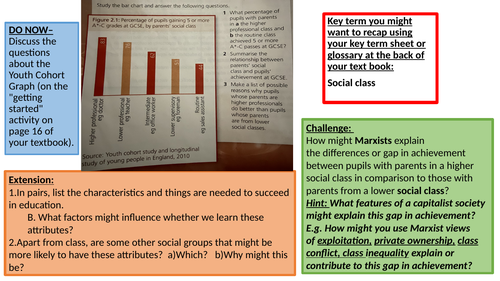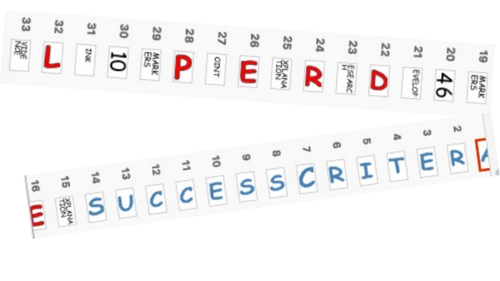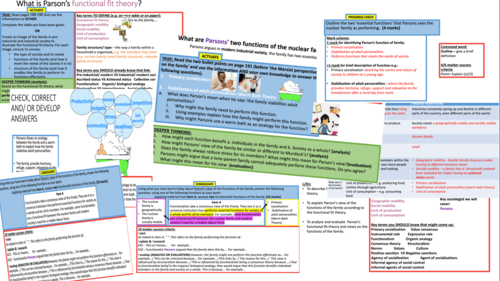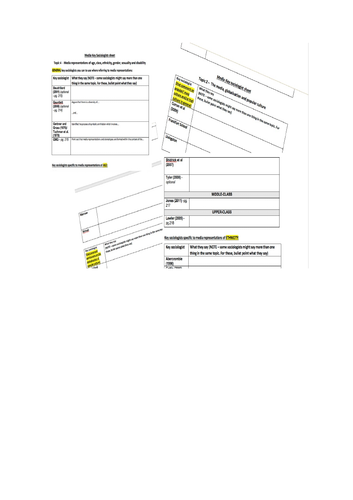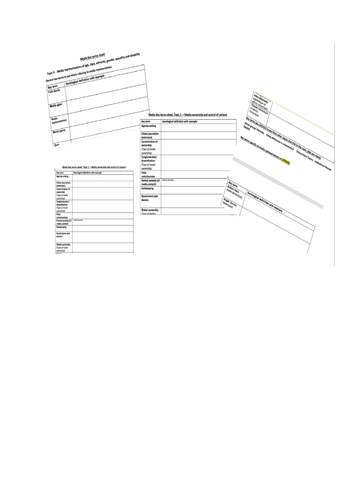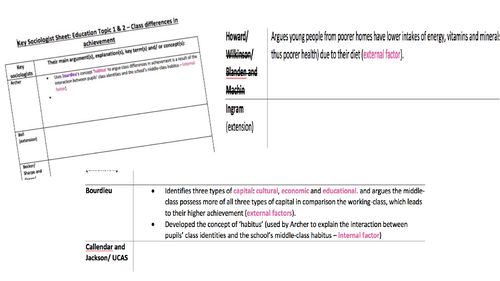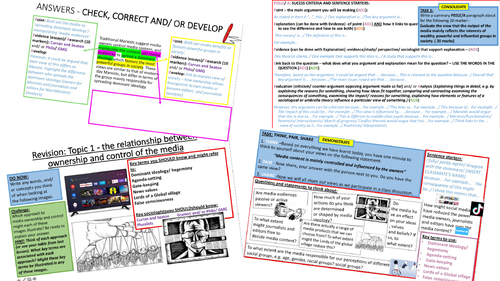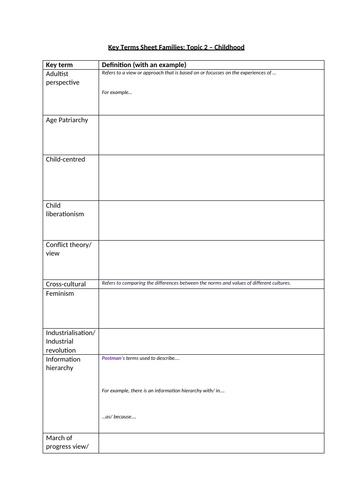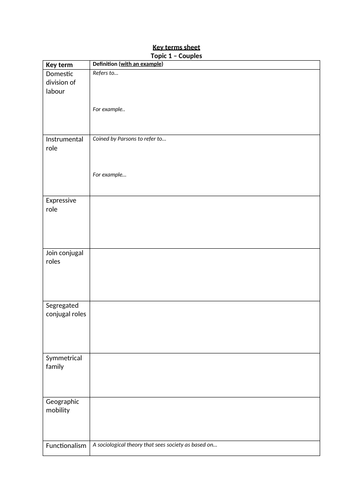
176Uploads
22k+Views
5k+Downloads
Sociology

AQA GCSE Sociology - Research Methods: Questionnaires
Detailed lesson with lots of scaffolding based on adaptive teaching that help students understand how to use questionnaires when investigating sociological issues (e.g. the main features of questions and describe when its appropriate to use, the strengths and weaknesses of questionnaires based on their main features and how to apply our knowledge of the strengths and weaknesses of questionnaires to different sociological research topic.
Examines questionnaires in general and postal questionnaires.
Makes links to practical ethical and theoretical issues.
Covers the following key terms: Questionnaires, Postal questionnaires
Key terms you should know that link:
Quantitative data vs Qualitative data – Reliable vs Valid – Practical issues – Ethical issues – Theoretical issues – Positivism vs Interpretivist – Sample size – Representative sample – Generalise findings - Social surveys – Questionnaire - Pre-determined - Closed questions - Open questions - Postal questionnaires - Online questionnaire
INCLUDES ANSWERS FOR ACTIVITIES
Includes model answer, student friendly mark-scheme and example answers ranging from 1-4/ 4 for a research method 4 marker
RESOURCES CAN BE FOUND AT THE END OF PPT

AQA GCSE Sociology - Research methods: Social surveys
Detailed lesson with lots of scaffolding based on adaptive teaching that help students understand what are the strengths and weaknesses of using social surveys to investigate sociological issues (e.g how to identify the main features of social surveys and when it would be appropriate to use them, explains the strengths and weaknesses of using social surveys to investigate social issues and applies the strengths and weaknesses of social surveys to an exam question).
Covers the following key terms: Social surveys, Telephone surveys
Makes references to key terms students should know that link to this lesson.
Lesson requires students to have prior knowledge of practical, ethical and theoretical issues to the strengths and weaknesses of social surveys
No starter included in the lesson
ANSWERS TO MAIN ACTIVITY ONLY.
Includes an exam question with scaffolding to help students answer.
I used the lesson as an opportunity to write an answer to the 4 marker with students.
Resources can be found at the end of PPT

A-level Sociology Education Class differences in achievement - Labelling
Detailed and differentiated (up and down), student led lesson that explores labelling, self-fulfilling-prophecy/ pygmallion effect, determinism and interactionism to enable students to understand the role of labelling in causing class differences in achievement/ working-class underachievement/ middle-achievement.
**ANSWERS TO MOST ACTIVITIES **
**COMES WITH FREE A-LEVEL HELP SHEET
**Made for AQA A-level but can be easily used for other specs (just need a different source of information/ textbook) **
Uses and refers to ’ AQA A Level Sociology Book One Including AS Level: Book one 3rd Revised edition by Rob Webb, Hal Westergaard, Keith Trobe, Annie Townend ’ textbook

AQA GCSE Sociology Education - Policies tackling inequality
Detailed lesson with lots of scaffolding based on adaptive teaching that help students understand to what extent might education reforms have tackled educational inequality (e.g the main education policies and reforms that have had an impact on the education system, using examples - how education policies or reforms have tackled inequality in education).
Covers educational policies that tackle class, gender and ethnic differences in educational achievement and gender differences in subject choice.
Covers the following policies: Marketisation policies and social inclusion
Key terms you SHOULD know that link:
Educational policies/ reforms, Marketisation, Open enrolment, Academies, Formula funding, League tables, Ofsted reports, Tripartite system, Class differences in educational achievement, Gender differences in educational achievement, Ethnic differences in educational achievement, Gender differences in subject choice, External vs internal factors, Cultural vs Material factors, Material deprivation, Cultural deprivation, Speech codes, Gender roles, socialisation, Gendered subject images, Gendered career opportunities
ANSWERS TO MOST ACTIVITIES INCLUDED .
RESOURCES CAN BE FOUND AT THE END OF PPT

AQA GCSE Sociology: Families - The domestic division of labour in contemporary families
Detailed lesson with lots of scaffolding based on adaptive teaching that help students understand what might be the domestic division of labour in contemporary families.
Cover the following key terms: Contemporary society, The Symmetrical family, The New man, Double shift / dual burden, Triple shift, Dual-career family
Covers the following sociologists: Functionalist Young and Wilmott, Feminist Oakley, Feminist Dunscombe and Marsden, Feminist Hochschild
ANSWERS TO ALL ACTIVITIES INCLUDED
Includes icons for visual learning
Includes activity based on ‘teaching to all’ pedagogical technique
Included a key term sheet and definitions for the lesson
RESOURCES CAN BE FOUND AT THE END OF THE PPT
REQUIRES OWENS AND WOODFIELD AQA GCSE TEXTBOOK FOR MAIN ACTIVITIES (OR ANY EQUIVALENT INFORMATION ON DECISION MAKING AND MONEY MANAGEMENT IN THE FAMILY) - for one actvitiy
Bundle

AQA GCSE Sociology: Family diversity lessons
L1: Explaning the increase in divorce:
Detailed lesson with lots of scaffolding based on adaptive teaching that explain the increase in divorce.
Includes a 4 marker with detail scaffolding to help students answer it. Includes a student-friendly mark scheme for self or peer-assessment.
Includes two versions of the table needed for the carousel activity - one with scaffolding and one without
Covers the following key terms: Secularisation, Stigma, Empty shell marriage
Covers the following sociologists: Office for National Statistics (ONS), Dennis , Fletcher, Hart, Goode, 1969 Divorce Reform Act, Mitchell & Goody
Covers the following key terms you should already know: Function (of an instituition), Individualism, Collectivism, Contemporary society, Consumerism/ Consumption
ANSWERS TO SOME MAIN ACTIVITIES INCLUDED
Makes references to key terms students should know – Promotes a spiral curriculum by making links to key terms that students might have previously been taught that link to this lesson.
RESOURCES CAN BE FOUND AT THE END OF PPT
L2:Theories of divorce:
Includes a ‘teaching to all’ activity that enables students to recap functionalist, Marxist and feminist views of society so that they can better understand their views on divorce.
Includes a 4 marker with scaffolding to help students answer it. Also includes a annotated 4 marker mark-scheme for self and peer-assessment and to enable students to understand how examiners will mark their 4 marker.
ANSWERS TO ALL ACTIVITIES INCLUDED
L3:Changing patterns of marriage and their explanations:
Detailed lesson with lots of scaffolding based on adaptive teaching that help students understand changing patterns of marriage and their explanations.
Examines the trends in first marriages, marriages in churches, serial monogamy and age of marriage and the reasons for them.
Provides scaffolding to allow student to apply Marxism, functionalism and feminism (and sociologists they should have previously learnt about - Parsons, Ansley, Zaretsky and Delphy and Leonard) to the changing patterns of marriage.
Mind map for main activity can be printed out or you can get students to copy it out.
Includes a 4 marker with scaffolding to help students answer it.
RESOURCES CAN BE FOUND AT THE END OF THE PPT.
Covers the following key terms: Serial monogamy, Re-marriages
Makes reference to the following key sociologists: Bridebook, Parsons, Ansley, Zaretsky, Delphy and Leonard
Makes links to the following key terms that you should already know: Stigma, Secularisation, Feminism, Cohabitation - promotes a spiral curriculum by making links to key terms that students might have previously been taught that link to this lesson.
ANSWERS TO ALL MAIN ACTIVITIES INCLUDED
L4: Changing family patterns:
Explores the patterns of the following: reconstituted families, one-person households, dual career families, fertility and childbearing, lone-parent, same-sex couples, extended families and cohabitation.
Starter activity allows students to go through a model 12 mark answer on divorce
Provides and activity to develop students ability to read and interpret exam items.
ANSWERS TO SOME ACTIVITIES INCLUDED
RESOURCES CAN BE FOUND AT THE END OF THE PPT
Includes a key term and definition sheet for the lesson (new key terms and makes links to key terms students should have previously learnt that link to this lesson).
L5:Family diversity
Detailed lesson with lots of scaffolding based on adaptive teaching that help students understand family diversity.
Includes a 4 marker with scaffolding to help students answer it.
Progress check can be taught as ‘teaching to all’ activity by getting students to show the family diversity they think is the answer on their fingers (1-5)s
Includes key term and definitions sheet for the lesson (new key terms and key terms students should have previously learnt that link to the lesson)
ANSWERS TO MOST ACTIVITIES INCLUDED
Covers the following key terms: Organisational diversity, Cultural diversity, Social class diversity , Cohort/ generational diversity, Life course diversity, Secularisation, Monogamy , Polygamy , Polygyny, Polyandry , Arranged marriage
Covers the following sociologists: 1969 Divorce Reform Act, 1970 Equal Pay Act, 2013 Marriage Act, The Rapoports Goode
Covers the following key terms that you should already know: Dual-career family, Family form/ structure/ type, Nuclear family, Conjugal roles, Conventional nuclear family, Lone-parent family, Vertically-extended family, Cohabitation , Same sex family, Horizontally-extended family , Empty-nest family, Family diversity, Contemporary society, Gender roles
Makes references to key terms students should know – Promotes a spiral curriculum by making links to key terms that students might have previously been taught that link to this lesson.
RESOURCES CAN BE FOUND AT THE END OF PPT

AQA GCSE Sociology: Research Methods- Longitudinal studies
Detailed lesson with lots of scaffolding based on adaptive teaching that help students understand longitudinal studies.
Cover the following key terms: longitudinal study, cohort, cross-sectional study
Covers the following sociologists: the UP series, The Millennium Cohort study
Makes references to key terms students should know- CHECK IF THIS IS THE CASE - Promotes a spiral curriculum by making links to key terms that students might have previously been taught that link to this lesson.
RESOURCES CAN BE FOUND AT THE END OF PPT
NO starter activity included
ANSWERS TO MOST ACTIVITIES INCLUDED
Includes student-friendly mark scheme for a 4 and 2 markers
Includes model answer for 4 marker
Teaches students how to answer 2 marker using an item
Includes so model 2 mark answers and answers that would not be awarded 2/2.

AQA A-level Sociology: Media- Media representations of disability
Detailed lesson with lots of scaffolding based on adaptive teaching that help students understand media representations of disability.
Covers the following key terms: disability, impairment, pitiable or pathetic, object of curiosity/ element of atmosphere, sinister or evil media stereotypes, super cripple, laughable/object of ridicule, own worst enemy, a burden, non-sexual, unable to participate in daily life.
Covers the following sociologists: Shakespeare, disability discrimination act, cumberbatch, broadcasting standards comission, brian et al, philo et al, time to change, barnes, cumberbatch and negrine.
Starter activity provides the opportunity for students to recap and be tested on what they should have leant so far in the media representations topic, e.g. media representations of children, symbolic annihilation, explanations of gender stereotyping in the media.
Requires information in textbook - 'SOCIOLOGY For AQA Volume 2 by Browne, Blundell & Law
Includes a discussion activity with sentence starters and prompts to promote oracy.
Includes a 10 marker with detailed scaffolding to help students answer it as well as a student friendly mark-scheme for peer and self assessment
ANSWERS TO SOME ACTIVITIES INCLUDED
Activities require pages from the AQA A Level Sociology Book One Including AS Level: Book one 3rd Revised edition by Rob Webb, Hal Westergaard, Keith Trobe, Annie Townend

AQA A-level Sociology: Education – Ethnic diff in achievement (Cultural factors)
**Detailed student led lesson that introduces students to ethnic differences in achievement and explores how different cultural factors (language, attitudes and values, and parental structure) might cause ethnic differences in achievement. To do this, the lesson explores the following key terms: ethnic group, ethnic differences in achievement, cultural deprivation, compensatory education and makes reference to other key terms students should have previously learnt (restricted code, working-class subculture, meritocracy, internal vs external factors, cultural vs material factors)
**Uses and refers to’ AQA A Level Sociology Book One Including AS Level: Book one 3rd Revised edition by Rob Webb, Hal Westergaard, Keith Trobe, Annie Townend’ textbook
RESOURCES CAN BE FOUND AT THE END OF THE PPT.
ANSWERS FOR MAIN ACTIVITY CAN BE FOUND ON NEXT SLIDE AFTER ACTIVITY SLIDE
STUDENT FRIENDLY MARK-SCHEME FOR 4 MARKER INCLUDE

AQA A-level Sociology: Education Class differences in achievement - Streaming and pupil subcultures
Detailed and differentiated (up and down), student led lesson that explores labelling, streaming, differentiation, polarisation, anti-school subcultures, pro-school subcultures, pupil subculture, A-C ecnonomy, educational triage to enable students to understand the role of streaming and pupil subcultures in causing class differences in achievement/ working-class underachievement/ middle-class achievement. Also covers and supports students in answering 4/6 markers using a success criteria and student-friendly mark-schemes.
ANSWERS TO MAIN ACTIVITIES AND EXAM QUESTIONS ARE INCLUDED
**ANSWERS TO MAIN ACTIVITIES INCLUDED
**Made for AQA A-level but can be easily used for other specs (just need a different source of information/ textbook) differentiated down for GCSE) lesson **
Uses and refers to ’ AQA A Level Sociology Book One Including AS Level: Book one 3rd Revised edition by Rob Webb, Hal Westergaard, Keith Trobe, Annie Townend ’ textbook

AQA A-level Sociology: Education Class - Material deprivation
Detailed and diiferentiated (up and down), student led lesson that explores class differences in achievement the role of material deprivation in causing or contributing to it. Introduces students to material vs cultural factors and external vs internal factors. Also introduces students to how to answer 4 and 6 markers using a success criteria and student-friendly mark-schemes.
ANSWERS TO MAIN ACTIVITIES AND EXAM QUESTIONS ARE INCLUDED
**Made for AQA A-level but can be easily used for other specs (just need a different source of information/ textbook) differentiated down for GCSE) lesson **
Uses and refers to ’ AQA A Level Sociology Book One Including AS Level: Book one 3rd Revised edition by Rob Webb, Hal Westergaard, Keith Trobe, Annie Townend ’ textbook

AQA A-Level Sociology Theory and Methods PLC (EDITABLE)
Personal Learning Checklist for the Theory and Methods unit in the AQA A-level Sociology syllabus. PLC includes topic and page numbers from the Westergaard and Townsend book one and two for content students my find hard to locate.

SOCIOLOGY DISPLAY - SUCCESS CRITERIA (for exam questions - AQA)
Display for A-level Sociology exam questions. PPT comes with a letter per slide to make:
PE - POINT+EXPLANATION - 4 & 6 marker
PERD - POINT + EXPLANATION + RESEARCH +DEVELOP - 10 markers
PEELE/A - POINT + EXPLANATION + EVIDENCE + LINK + EVALUATE/ ANALYSIS - 20 & 30 markers
Made for A-level AQA Sociology

AQA A-level Sociology Families: Theories of the family – Parson’s view of the family
Detailed and differentiated (up and down) student-led lesson that examines, analyses and evaluates functionalist Parsons view of the family (functional fit theory) and his functions (mainly stabilisation of adult personalities – NOT primary socialisation).
Lesson explores the key terms: Functional fit theory, Stabilisation of adult personalities (Warm Bath Theory), Functional fit theory, Geographic mobility, Social mobility, Unit of production and Unit of consumption.
Lesson makes links to general functionalist key terms and family key terms that students might have previously been taught.
Main activity makes reference to AQA A-level Book 1 by Townsend
***** MOST ACTIVITIES INCLUDE ANSWERS****
Starter assesses prior learning on family topics: couples, childhood and Murdock’s functions.
***** WORKSHEETS AT THE END OF THE PPT**

KEY SOCIOLOGISTS SHEETS AQA A-level Sociology Media: Topics 1-4
Detailed and scaffolded (e.g. SOME sentence starters/ prompts, separating sociologists who comment on different aspects of each topic, SOME page numbers for sociologists that might be more difficult to find, etc.) key sociologists sheets that requires students to write done what key sociologists from topics 1-4 say.
Contains the main key sociologists in Topics 1-4 of the media unit for AQA A-level Sociology:
Topic 1 - Ownership and control of the media output
Topic 2 - The media, globalisation and popular culture
Topic 3 -the processes of selection and presentation of the content of the news
Topic 4 -media representations of age, social class, ethnicity, gender, sexuality and disability.
**REQUIRES textbook - 'SOCIOLOGY For AQA Volume 2 by Browne, Blundell & Law **

KEY TERM SHEETS AQA A-level Sociology Media: Topic 1-4
Detailed and scaffolded key term sheet that requires students to fill out the definitions themselves. (e.g. SOME sentence starters/ prompts, separating key terms in term of social groups for topic 4, identifiy the key terms that relate to media stereotypes for topic 4, etc.)
Contains the main key terms used in Topic 1-4 of the media unit for AQA A-level Sociology:
Topic 1 - Ownership and control of the media output
Topic 2 - The media, globalisation and popular culture
Topic 3 -the processes of selection and presentation of the content of the news
Topic 4 -media representations of age, social class, ethnicity, gender, sexuality and disability.
The bottom of the sheet has a section dedicated to the key terms learnt in previous units and topics that might link to this topic. Good form of revision for the students and allows for a spiral curriculum.
**REQUIRES textbook - 'SOCIOLOGY For AQA Volume 2 by Browne, Blundell & Law **

AQA A-level Sociology Education Topic 1- 2 key sociologists sheets
Detailed and scaffolded (e.g. SOME sentence starters/ prompts, model examples of what sociologists say (and what students are expected to write and how), etc.) key sociologists sheets that requires students to write done what key sociologists from education:
Topic 1 - Class differences in achievement (external factors)
Topic 2 - Class differences in achievement (internal factors)
Sociologists in alphabetical order
Good form of revision and revision resource for the students.
**BASED ON CONTENT in textbook - AQA A Level Sociology Book One Including AS Level: Book one 3rd Revised edition by Rob Webb, Hal Westergaard, Keith Trobe, Annie Townend ’ textbook

AQA A-level Sociology: Media Topic 1 Ownership and control Revision lesson
Detailed and diiferentiated (up and down), student led lesson that recaps:
patterns of ownership
the mainpulative, hegemonic and plurlaist approach to media ownerhsip and control
formal and informal controls of media output or content.
References the following concepts: Agenda-setting Gate-keeping News values Marxism Structuralism vs Interactionism
Ownership Ideology Capitalism False consciousness Neo-Marxism
Lords of the Global Village Formal and informal methods of control.
ANSWERS INCLUDED FOR SOME MAIN ACTIVITIES INCLUDED**
RESOURCES FOR LESSON CAN BE FOUND AT THE END OF PTT
Made for AQA A-level but can be easily used for other specs (just need a different source of information/ textbook)
**Based on the content in 'SOCIOLOGY For AQA Volume 2 by Browne, Blundell & Law **

KEY TERMS SHEET - AQA A-level Sociology Families: Topic 2 Childhood
Alphabetical key term sheet for AQA A-level Sociology Family Topic 2 Childhood that requires students to fill out the definitions themselves. Includes some sentence starters for more difficult key terms.
**Good form of revision for students and can be used as a revision resource to develop AO1 once filled out. **
**BASED ON CONTENT in textbook - AQA A Level Sociology Book One Including AS Level: Book one 3rd Revised edition by Rob Webb, Hal Westergaard, Keith Trobe, Annie Townend ’ textbook

KEY TERMS SHEET - AQA A-level Sociology Families: Topic 1 Couples
Key term sheet for AQA A-level Sociology Family Topic 1 Couples that requires students to fill out the definitions themselves. Includes some sentence starters for more difficult topics.
Good form of revision for students and can be used as a revision resource to develop AO1 once filled out.
**BASED ON CONTENT in textbook - AQA A Level Sociology Book One Including AS Level: Book one 3rd Revised edition by Rob Webb, Hal Westergaard, Keith Trobe, Annie Townend ’ textbook











